COSEE-OLC is focused on bringing cutting-edge research about the ocean out of the laboratory and into learning communities. These communities can put that knowledge to work so that citizens become better stewards of our marine and aquatic environment. The COSEE-OLC effort is organized around four intersecting initiatives:
- Cultivate and Study a Marine Naturalist Volunteer Community
- Engage Citizens and Students in Contemporary Ocean Science Research
- Conduct and Communicate Research on Learning Science in Diverse Communities
- Conduct Inreach to Researchers, Outreach to Citizens
Among the accomplishments in our fifth year, several stand out:
- The successful pilot year of the SoundCitizen Science Apprenticeship Program
- The launching of the My Place in Puget Sound curriculum for high school students
- The Broader Impacts workshop in January 2010: Our inreach initiative to better connect with NSF-funded ocean researchers, giving them practical information on sharing research with a broad audience, including a session on diversity
- Programs and events throughout 2009/10 for marine naturalist volunteers, scientists (ocean, marine and learning) and educators to come together to network and learn about current research
- Ocean Inquiry Project research cruises throughout 2009-2010 and a workshop on working with diverse audiences
- The success of continued efforts to conduct and publish research on how people learn about the ocean and the environment, and to communicate learning sciences research to oceanographers and marine volunteers
- Hosting the COSEE Network May Meeting
Below we provide a brief update on these accomplishments.
Sound Citizen Science Apprenticeship Program (SCSA)
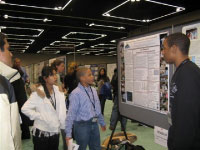 | |
High school apprentices presenting their research poster at the 2010 Ocean Science Meeting in Portland, OR | |
Funded through NSF’s Opportunities for Enhancing Diversity in the Geosciences, the apprenticeship program is a two-year pilot program that represents a direct leveraging of COSEE-OLC activities to broader audiences. It also directly links COSEE’s missions in education and in scientist engagement by steeping apprentice activities in cutting-edge geosciences research. SCSA is a partnership between the University of Washington’s School of Oceanography, the UW Institute for Science and Mathematics Education and two youth groups in Seattle — YMCA BOLD and Passages Northwest.
The SCSA program combines geosciences research and mentorship experiences for first-generation immigrant, Latino and African American youth, ages 13-17, from urban neighborhoods in the Seattle area. We set out to create “science learning apprenticeships” in which youth are mentored by UW scientists and local community members. To do this, apprentices collaborated with project staff and scientists to identify researchable questions, collect and process samples, and interpret and report the results. The apprentices worked in Rick Keil’s lab as part of the SoundCitizen Program and decided to examine the presence of plasticizers, known contaminants, in natural and built sources of water. The second year of this program will start in Fall 2010, and will capitalize on the successes of this pilot year to focus on engaging middle school girls from underrepresented groups in science.
| | 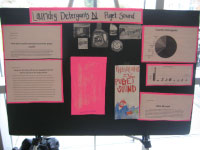 |
| Poster designed by high school students and presented at the University of Washington in March 2010 |
The Launching of the My Place in Puget Sound High School Curriculum
Over the past year COSEE-OLC has fostered a close relationship with the Ocean and Coastal Interdisciplinary Sciences GK-12 (OACIS GK-12) program and local area schools. Along with SoundCitizen, COSEE-OLC and OACIS GK-12 collaborated to create high school level curricular materials, My Place in Puget Sound. The goal was to create a place-based inquiry science unit that addresses environmental issues with real and current data, is community relevant, and empowers students to act around environmental issues. The culminating event was a public poster session held in March at the University of Washington during which students shared their projects with high school students from other schools, citizens, scientists and graduate students. This project leveraged strengths of all three contributing projects to create something that none of them could create alone.
The Broader Impacts workshop in January 2010
COSEE-OLC partnered with Washington Sea Grant to host a two-day program titled Addressing Broader Impact Requirements for Research Proposals. The program got off to a great start with an evening event that drew over 200 ocean and marine scientists, learning scientists, educators, graduate students, marine educators and family members at the Seattle Aquarium. The evening included a reception, offering an opportunity to network, followed by a presentation by Dr. Bruce Alberts titled Redefining Science Education and the Roles That Scientists Play in Society. Dr. Alberts is the current editor of the journal Science and former president of the National Academy of Sciences. A small pre-event dinner was held for Dr. Alberts and University of Washington ocean/marine science and Society for the Advancement of Chicanos and Native Americans (SACNAS) graduate students. A separate program was given by aquarium staff during the keynote presentation for participants’ children.
| | 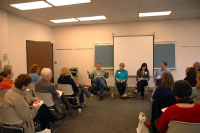 |
| Panelists and participants from the How to Communicate Your Science to the Media session |
The following day included an all-day workshop at the University of Washington attended by over 150 participants (University and College scientists, faculty, educators, graduate students, marine educators and other invited guests). Workshop session topics included:
- How to leverage yourself, your lab group, and your research into existing outreach opportunities
- Expert advice on how to communicate your science to lay audiences, to the media, to decision makers and to a K-12 audience
- How to use what you and your lab group already do to satisfy broader impact requirements
- Strategies for promoting diverse participation in the sciences
The session leaders and members included experts ranging from Pulitzer Prize-winning journalists to a Washington State Governor’s Office policy executive; from practicing learning and ocean scientists to current graduate students involved in outreach. The institutions represented ranged widely as well, including all those in the COSEE-OLC partnership (and PIs from each participated in the panels), Washington Sea Grant, the Pacific Science Center, The Seattle Times, the UW Institute for Science and Math Education, the Port Townsend Marine Science Center, and more. Post-event survey results showed that participants gathered both specific and general knowledge to improve their broader impacts plans, statements, and practices during the research process.
Engaging a Community of Marine Naturalist Volunteers, Scientists, Educators and Citizens
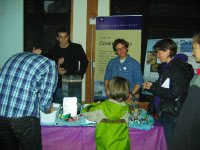 | |
Seattle Aquarium guests participating in the School of Oceanography’s popular display The Great Plankton Race | |
During Year Five we hosted, sponsored and supported events that provided opportunities for the general public to learn more about ocean science both locally and nationally, as well as to expand our ocean learning community. The end of summer of 2009 included an event to celebrate Marine Volunteers and the Ocean Sciences with an evening program in the Seattle Aquarium's Puget Sound Great Hall. Attended by over 140 volunteers and leaders of marine based organizations, the program included a poster session that gave participants the opportunity to learn about current research and mingle with ocean and learning scientists. A presentation by a coastal geologist from the Washington Department of Ecology on the potential effects of climate change in the Puget Sound region concluded the evening.
In Fall 2009 we sponsored the participation of over 200 marine volunteers, leaders, educators, scientists and their families at the Seattle Aquarium’s Family Science Weekend. This annual event is intended to involve Seattle Aquarium members, the general public and especially families in hands-on learning about ocean science. The University of Washington School of Oceanography and COSEE-OLC were popular destinations among many science displays and activities focused on educating the public about the ocean, science and research.
| | 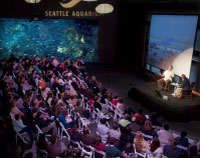 |
| Dr. Rick Keil with series moderator Jeff Renner at the Seattle Aquarium |
In the Spring of 2010 COSEE-OLC sponsored the Seattle Aquarium’s Sound Conversations lecture series. This series is designed to engage and inform a general public audience about current ocean sciences related to the health of the world’s oceans and marine life. The series format is interactive and brings the audience into direct conversation with the speaker about their work, careers and interests. Dr. Rick Keil, PI of COSEE-OLC, was one of the featured speakers this year, along with Philippe Cousteau and Dr. Brady Barr.
Ocean Inquiry Project Research Cruises
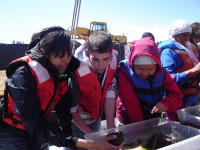 | |
High school apprentices from the SCSA program evaluating benthic organisms on the OIP cruise offered during the COSEE Network Meeting in May | |
COSEE-OLC's collaborating partner, Ocean Inquiry Project (OIP), continues to provide opportunities to integrate our communities through experiential field work. OIP’s research cruises foster an appreciation of the ocean and increase awareness of our impact on it for students and volunteers, ranging from fifth graders to retirees. New to this year’s training of OIP volunteers and staff was a two-part workshop on engaging and working with diverse audiences. All OIP cruise participants have been enlightened to the process of scientific research through direct involvement. Feedback from community members and others who have participated in OIP cruises highlight the successful nature of the collaborative shipboard environment, fostering new mutual respect between students, teachers, volunteers and researchers.
Learning Science and Environmental Education Research Update
Through the University of Washington LIFE Center, COSEE-OLC continues to conduct research on how people learn about the ocean and the environment, and communicates those findings to ocean scientists, other learning scientists, and teachers. In the past year, findings from this research have been presented at the American Anthropological Association, the annual meeting of the American Educational Research Association (AERA), and the International Society of the Learning Sciences (ICLS). A paper titled The role of borders in environmental education: Positioning, power, and the paradox of categories was recently submitted to the journal Ethnography and Education for review.
The COSEE Network May Meeting
| | 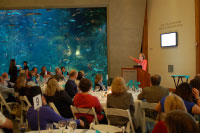 |
| COSEE Network Meeting participants and members of COSEE-OLC's ocean learning community listen to guest speaker Dr. Patrick Christie |
COSEE-OLC had the pleasure of hosting the Network meeting in May. We were pleased to have members of the COSEE Network join us at the Seattle Aquarium for dinner and a presentation by University of Washington scientist Dr. Patrick Christie. The evening provided the opportunity to meet and talk with some of the participants of our ocean learning community. Rick Keil’s talk at Sound Conversations and the Ocean Inquiry Project cruise later in the week were welcomed options for those attending the meeting.
Annotated Bibliography and the Diversity Working Group
Prepared as a resource to inform COSEE’s activities related to broadening participation, an extensive annotated bibliography provides an overview of resources central to COSEE’s work, including organizations, policy documents, research studies and intervention studies. The bibliography highlights key resources that relate to increasing diversity in the sciences, and is organized according to demographics, how people learn in diverse communities, culturally responsive science instruction and evaluation, and establishing partnerships. The Diversity Working Group’s bibliography was shared with the COSEE Council in November and is available to download from the Network website.
Visit COSEE-OLC!

